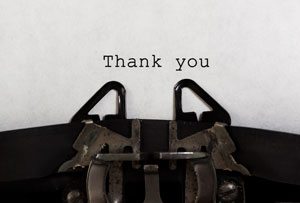 If you are, or have been, a parent of young children, you’ve probably used the term “put on your listening ears”. It’s good advice for people in business too!
If you are, or have been, a parent of young children, you’ve probably used the term “put on your listening ears”. It’s good advice for people in business too!
Sometimes we fail to listen to our customers. When was the last time you asked your customers about their experience of your business? You can do this formally (via surveys and feedback forms) of informally (by chatting to them when you see them in person or communicate via email). It can be a daunting task! Most of us don’t really want to hear any negative feedback, but honestly, not knowing those negative experiences will be a lot more damaging that assuming ‘no news is good news’. You may find that customers slowly drift away with no explanation. But if you offer open channels to providing feedback, you might just find that that in itself speaks volumes about your business to your customers.
Sometimes we fail to listen to our bodies. When was the last time you took a decent break from work? How often do you work at night or on the weekends (if this is additional to your ‘usual’ hours)? Are you getting enough sleep – or getting restful sleep? Are you eating well? Whether we listen to them or not, our bodies generally tell us when things are not working at optimum. We make silly mistakes, we find it harder to concentrate, we get frequent headaches. If any of those scenarios describe you, take stock of what your body might be telling you.
And lastly, sometimes we fail to listen to the right people. If you have surrounded yourself with people who don’t believe in what you do, who have only negative things to say, then you are listening to the wrong people. Find like-minded people in business. Be careful who amongst your friends you share business ideas with, as they will view your passion through their own worldview lens. And most definitely listen to the voice inside that encouraged you in the first place to do what you’re doing – and continue to do it well.
Michelle Grice writes a weekly column for business women in The Western Weekender







 This year I have actively been attempting to take my own advice and stop multitasking. In reality it has been more a case of trying to reduce rather than completely eliminate! But it is a start.
This year I have actively been attempting to take my own advice and stop multitasking. In reality it has been more a case of trying to reduce rather than completely eliminate! But it is a start.
 Over the past few weeks, I have been dealing with some large companies. Those interactions have been less than satisfactory to say the least, and have reminded me of the enormous advantage small businesses have over big business. Let me give you a rundown of my experiences:
Over the past few weeks, I have been dealing with some large companies. Those interactions have been less than satisfactory to say the least, and have reminded me of the enormous advantage small businesses have over big business. Let me give you a rundown of my experiences:
 When you have been in business for a while, it is easy to become complacent. You rely on those repeat customers and regular clients. You take for granted that the great suppliers you have established ties with will always be reliable. You get used to the support of colleagues in your business networks.
When you have been in business for a while, it is easy to become complacent. You rely on those repeat customers and regular clients. You take for granted that the great suppliers you have established ties with will always be reliable. You get used to the support of colleagues in your business networks.
 This week the mainstream media, social media and every day conversations have been flooded with stories of terrorism in Paris and Beirut. A quick Google search will show you that acts of terrorism are a regular occurrence at this time in history; some claiming many lives, others smaller in scale that tend to go unreported by mainstream media.
This week the mainstream media, social media and every day conversations have been flooded with stories of terrorism in Paris and Beirut. A quick Google search will show you that acts of terrorism are a regular occurrence at this time in history; some claiming many lives, others smaller in scale that tend to go unreported by mainstream media.
 Most of us don’t really like change, do we? We tend to err on the side of comfort and safety, and will often choose the ‘known’ over the ‘unknown’ just because it’s familiar, even if the ‘unknown’ holds some great possibilities.
Most of us don’t really like change, do we? We tend to err on the side of comfort and safety, and will often choose the ‘known’ over the ‘unknown’ just because it’s familiar, even if the ‘unknown’ holds some great possibilities.
 I was watching a program on television recently concerning the rise of videos, and in particular, viral videos (those that become enormously popular by being shared unprompted on social media and the internet in general). It focused on YouTube and gave a short history of how the founders of YouTube got started. In short, their first attempts at launching a video platform were dismal – they posted a video and it received one view! They tried a few other changes to their idea and after a few false starts, YouTube quickly became one of the fastest growing sites on the web. About one year after launching, Google bought YouTube for US$1.65billion!
I was watching a program on television recently concerning the rise of videos, and in particular, viral videos (those that become enormously popular by being shared unprompted on social media and the internet in general). It focused on YouTube and gave a short history of how the founders of YouTube got started. In short, their first attempts at launching a video platform were dismal – they posted a video and it received one view! They tried a few other changes to their idea and after a few false starts, YouTube quickly became one of the fastest growing sites on the web. About one year after launching, Google bought YouTube for US$1.65billion!
 If you are on social media (Facebook, Twitter, Instagram and so on) you will probably agree that there is a lot of ‘noise’ on there. There are so many companies, organisations, media outlets and other parties vying for your attention. For business owners, the million dollar question is ‘how do I break through all the noise to reach my customers?’. There are two examples I have come across recently that may provide some answers.
If you are on social media (Facebook, Twitter, Instagram and so on) you will probably agree that there is a lot of ‘noise’ on there. There are so many companies, organisations, media outlets and other parties vying for your attention. For business owners, the million dollar question is ‘how do I break through all the noise to reach my customers?’. There are two examples I have come across recently that may provide some answers.
 I recently discovered that someone I thought I could trust was not trustworthy. This person divulged information that I had assumed would not be repeated to others. This assumption was based on the fact that we were good friends, but also because they had shared similar confidential information with me. It was not that I stored that person’s information thinking that it was a form of ‘insurance’, but rather, an assumption that we had a high level of trust because we were both willing to share this type of information with each other.
I recently discovered that someone I thought I could trust was not trustworthy. This person divulged information that I had assumed would not be repeated to others. This assumption was based on the fact that we were good friends, but also because they had shared similar confidential information with me. It was not that I stored that person’s information thinking that it was a form of ‘insurance’, but rather, an assumption that we had a high level of trust because we were both willing to share this type of information with each other.
 You have probably seen some of your friends complain about something trivial via social media, and they might include the hashtag ‘first world problem’. It is a way of sharing a frustration but also acknowledging that it is only something that a privileged few in the world could actually complain about.
You have probably seen some of your friends complain about something trivial via social media, and they might include the hashtag ‘first world problem’. It is a way of sharing a frustration but also acknowledging that it is only something that a privileged few in the world could actually complain about.
 You may know of people who seem to always have someone or something to blame for their circumstances or problems. Those same people are likely to be quite negative about life in general, seeing situations from a ‘glass half empty’ perspective.
You may know of people who seem to always have someone or something to blame for their circumstances or problems. Those same people are likely to be quite negative about life in general, seeing situations from a ‘glass half empty’ perspective.
 Although many would argue that there is still a long way to go before we see true equality for women, it does pay to look back at what some trailblazing women have done. It makes us realise how far we have come and what amazing strength they had and sacrifice these women made. For women in business, this ‘trailblazing’ has given modern women much more scope and freedom to pursue their entrepreneurial dreams.
Although many would argue that there is still a long way to go before we see true equality for women, it does pay to look back at what some trailblazing women have done. It makes us realise how far we have come and what amazing strength they had and sacrifice these women made. For women in business, this ‘trailblazing’ has given modern women much more scope and freedom to pursue their entrepreneurial dreams.
 We all have opinions. With the rise of social media, some of us have suddenly found a broader and louder platform to share those opinions. You are probably familiar with the terms ‘trolling’ and ‘keyboard warriors’ in reference to online behaviour, and many of you are likely to have experienced it to some degree. Trolling generally amounts to bullying, with the ‘trolls’ hiding behind the anonymity of the online world. They use their keyboard to unleash sometimes quite vitriolic tirades against people who in ‘real life’ they would never confront or speak to in that manner.
We all have opinions. With the rise of social media, some of us have suddenly found a broader and louder platform to share those opinions. You are probably familiar with the terms ‘trolling’ and ‘keyboard warriors’ in reference to online behaviour, and many of you are likely to have experienced it to some degree. Trolling generally amounts to bullying, with the ‘trolls’ hiding behind the anonymity of the online world. They use their keyboard to unleash sometimes quite vitriolic tirades against people who in ‘real life’ they would never confront or speak to in that manner.
 I am an unapologetic winter-hater! I have the occasional happy thought towards the cold weather when I get to wear a favourite coat. But that small pleasure is never enough to compensate for dreary, shorter days of wearing layers and battling the cold and flu season.
I am an unapologetic winter-hater! I have the occasional happy thought towards the cold weather when I get to wear a favourite coat. But that small pleasure is never enough to compensate for dreary, shorter days of wearing layers and battling the cold and flu season.
 This week I read about a very inspirational woman. Her name is Barbara Knickerbocker-Beskind and she is 91 years old. Her life story is amazing (please Google and read more about her!) which has led her to working in her ‘dream job’ as an advisor for a design firm, where she helps them to design products and services for the elderly and vision impaired.
This week I read about a very inspirational woman. Her name is Barbara Knickerbocker-Beskind and she is 91 years old. Her life story is amazing (please Google and read more about her!) which has led her to working in her ‘dream job’ as an advisor for a design firm, where she helps them to design products and services for the elderly and vision impaired.
 If you are a perfectionist, it is likely that you are also a planner. You have a daily plan, a weekly plan, monthly goals and quarterly reporting. These are all good things to have in a business. But sometimes, you may find that despite all your planning, you still feel stressed and it seems like you still cannot achieve all the things you set out to do. You may end up feeling like it was a waste of time planning in the first place!
If you are a perfectionist, it is likely that you are also a planner. You have a daily plan, a weekly plan, monthly goals and quarterly reporting. These are all good things to have in a business. But sometimes, you may find that despite all your planning, you still feel stressed and it seems like you still cannot achieve all the things you set out to do. You may end up feeling like it was a waste of time planning in the first place!
 Let’s face it, most of us are creatures of habit. We tend to gravitate towards the familiar and choose comfort over discomfort. And why wouldn’t we? It is the human condition to strive for happiness. But is it possible to grow and change for the better without stretching ourselves into new situations?
Let’s face it, most of us are creatures of habit. We tend to gravitate towards the familiar and choose comfort over discomfort. And why wouldn’t we? It is the human condition to strive for happiness. But is it possible to grow and change for the better without stretching ourselves into new situations?
 On the weekend, my son’s soccer team had one of the best matches of their season. They executed every instruction from their coach perfectly and they worked together seamlessly as a team. They kept in position (not easy for under 10’s!) and they were fearless against an undefeated team who have won by very large margins. Unfortunately, my son’s team didn’t get the win (in case you are wondering, it was 3-1), but the players were far from dejected. They knew they had played an amazing game and were proud of themselves for the way they had played, despite not winning (as were the coach and parents!).
On the weekend, my son’s soccer team had one of the best matches of their season. They executed every instruction from their coach perfectly and they worked together seamlessly as a team. They kept in position (not easy for under 10’s!) and they were fearless against an undefeated team who have won by very large margins. Unfortunately, my son’s team didn’t get the win (in case you are wondering, it was 3-1), but the players were far from dejected. They knew they had played an amazing game and were proud of themselves for the way they had played, despite not winning (as were the coach and parents!).
 It has been a while since I’ve presented some favourite inspirational quotes for women in business. And because I’ve had a challenging week, it seems like an appropriate time!
It has been a while since I’ve presented some favourite inspirational quotes for women in business. And because I’ve had a challenging week, it seems like an appropriate time!
 My ten year old scored his first goal of the soccer season on the weekend (complete with an enthusiastic post-goal celebration!). After the match, his coach told us that he had asked my son to be goalkeeper for one half of the match, as he has been asking the coach to do this all season. To the coach’s surprise (and probably some amusement) my son said “No, I’d prefer to be on the field because I want to score a goal today”. And lo and behold he did!
My ten year old scored his first goal of the soccer season on the weekend (complete with an enthusiastic post-goal celebration!). After the match, his coach told us that he had asked my son to be goalkeeper for one half of the match, as he has been asking the coach to do this all season. To the coach’s surprise (and probably some amusement) my son said “No, I’d prefer to be on the field because I want to score a goal today”. And lo and behold he did!